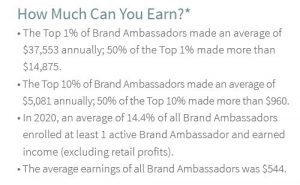Last year I noticed a ton of nutrition clubs popping up everywhere – twelve at one point, although at least two have closed and one has changed ownership last I checked. I was curious, so I did some digging and quickly realized that they were all owned by Herbalife distributors and sold Herbalife products. I wrote an article that was critical of the multi-level marketing (MLM) business structure (also known as direct selling, network marketing, and social selling) as a whole and Herbalife and their nutrition clubs specifically. If you haven’t already, get comfy and read it here. Maybe it was naive to think one article written by little ol’ me would have much of an impact. I was hoping to spare some of my friends from being sucked in, and maybe the article has or will, and I just don’t know it yet. What I do know is that I got invited to an MLM party just days after it was published. I still see MLM pitches in my newsfeed daily. I still see people getting pulled in. I’d like to state up front that joining an MLM says nothing about someone’s intelligence level. Some very smart people join MLMs. The recruitment strategies these companies use are extremely compelling when done well, and plenty of people still believe that these are legitimate money-making opportunities. So here I go again. Some people are rolling their eyes already, but I do not care because I am an Enneagram 1 with a cause, and I cannot stop.
 All MLMs are predatory by their very nature. The entire business model relies on continuously recruiting new members as customers who spend their money to buy into the “business opportunity” and then usually fizzle out when they realize how incredibly expensive the products are, how much work it takes to sell, and how difficult it is to recruit other people to join your downline. They call it a business opportunity, but the whole thing is set up for you to fail. What other industry encourages people to recruit their own direct competition? If I start a business selling pens, I’m not about to go across the street to my neighbor and try to get her to sell the exact same pens too. That’s not a smart move for my sales goals. But that doesn’t matter for an MLM, because sales of a product aren’t the point, recruiting other people into your downline is. And as it turns out, that is incredibly hard to do, and it’s even harder to keep them in your downline once you have convinced them to join. Jon Taylor, founder of the Consumer Awareness Institute, published an eBook in 2011 called The Case (for and) against Multi-level Marketing. In his study of over 400 MLM companies, he found that at least 50% of people who join MLMs drop out in less than a year, and at least 90% quit within 5 years. If you’re someone who just joined as a distributor for the discount offered on the starter pack, you’re referred to as a “kitnapper” and looked down on. And joining for product discounts will only get you so far. MLMs require minimum purchases to stay active, and there is only so much product you can buy for personal use. At some point, you’ll have enough shampoo to stock a bunker. A lot of you probably have that one friend or relative who gives MLM products for every Christmas and birthday gift. These product lovers spend a lot of money buying things they don’t really need or want and saving it as the “perfect gift” just to keep a discount that is cancelled out by the extra purchases.
All MLMs are predatory by their very nature. The entire business model relies on continuously recruiting new members as customers who spend their money to buy into the “business opportunity” and then usually fizzle out when they realize how incredibly expensive the products are, how much work it takes to sell, and how difficult it is to recruit other people to join your downline. They call it a business opportunity, but the whole thing is set up for you to fail. What other industry encourages people to recruit their own direct competition? If I start a business selling pens, I’m not about to go across the street to my neighbor and try to get her to sell the exact same pens too. That’s not a smart move for my sales goals. But that doesn’t matter for an MLM, because sales of a product aren’t the point, recruiting other people into your downline is. And as it turns out, that is incredibly hard to do, and it’s even harder to keep them in your downline once you have convinced them to join. Jon Taylor, founder of the Consumer Awareness Institute, published an eBook in 2011 called The Case (for and) against Multi-level Marketing. In his study of over 400 MLM companies, he found that at least 50% of people who join MLMs drop out in less than a year, and at least 90% quit within 5 years. If you’re someone who just joined as a distributor for the discount offered on the starter pack, you’re referred to as a “kitnapper” and looked down on. And joining for product discounts will only get you so far. MLMs require minimum purchases to stay active, and there is only so much product you can buy for personal use. At some point, you’ll have enough shampoo to stock a bunker. A lot of you probably have that one friend or relative who gives MLM products for every Christmas and birthday gift. These product lovers spend a lot of money buying things they don’t really need or want and saving it as the “perfect gift” just to keep a discount that is cancelled out by the extra purchases.
It is also estimated that 99% of people who join MLMs lose money. If you’re curious about what distributors in a specific company are earning, you can look up the annual income disclosure statements that the companies are encouraged to publish. These disclosures are intended to increase transparency, but they are typically vague and intentionally give as little information as possible. Some companies only give averages, some give ranges, some don’t include the distributors that don’t earn any commissions, and some don’t publish disclosures at all. Keep in mind when reading these figures that they are using gross earnings paid out to their distributors; they do not account for the money that the distributors spend in fees to the company just to stay active and qualify for commissions, purchasing products for themselves, paying taxes, travel costs for trips and conferences, other business expenses, etc. The companies probably don’t, and don’t want to, track net profits of their distributors because those numbers would look very bad for them. For example, the Plexus 2020 income disclosure statement only includes averages, which don’t tell us much. Does this include every single distributor including those who made $0? Exactly how many distributors were there that year and what percentage of them made anything? We don’t know. But according to them, the average earnings for all brand ambassadors was $544 for the entire year. The top 1% of the company earned an average of $37,553. That is BEFORE you subtract your costs. Target pays $15/hour starting out, and they don’t require you to pay them for the pleasure of working there. Just saying. If you’re interested in learning more about the financial side of MLMs, I’d suggest checking out The Finance Guy’s website.

The products themselves are expensive because they are vastly overpriced in order to support a complex system of upline commissions (called “overrides”) and still allow the corporations to make a hefty profit. It always confuses me that MLMs fall under the “direct selling” category of businesses because it seems like a particularly indirect way of selling. You’re adding a bunch of middle(wo)men to the process. On top of the normal factors businesses must take into account when pricing a product such as employees, manufacturing, transportation, marketing, etc., MLMs also have to account for all the levels of commission they might have to pay out. Each level of the pyramid – sorry, “compensation plan” – takes a percentage of each sale, so the products have to be marked up so the company can still make a profit. Some companies handle that by having very high prices, and some handle that by having very low quality products. Some do both. You think these companies are doing this out of the goodness of their hearts? No way, it’s the money, and there is a lot to be had by selling a dream to vulnerable people. And it is the dream–of financial freedom, flexibility, health, wealth, and community–that they are selling because their products are nothing to write home about. Show me an MLM product, any MLM product, and I will show you a cheaper alternative readily available at retail stores or online that is often better quality. Or I might tell you that the product isn’t actually worth using at all. If you currently use an MLM product that you love but want to find a non-MLM dupe for, there are people on the internet who are happy to help. Heck, I’m happy to help. Because here’s the reality: If these “magic” MLM products were really something special, they would already be on store shelves. If a company developed a product that could actually target specific areas of fat on your body it would be game over for the entire dieting industry. But no one has because it’s not possible, and anyone who tells you that chewing 2 gummies a day or choking down a spoonful of mystery goo is going to melt away your belly fat is a lying liar who lies.
Because here’s the reality: If these “magic” MLM products were really something special, they would already be on store shelves.
The health and fitness MLMs are particularly gross in my opinion, and have been weighing heavily on me lately. I’ve said my piece about Herbalife, but it’s far from the only one. And even though not all of them have the long and sordid history that Herbalife has, they are all unethical. If you’re interested in the dark underbelly of pretty much any major MLM, just do an internet search with the name of the company and “anti-mlm” or “scam.” There is an entire Anti-MLM movement of ex-distributors, journalists, bloggers, YouTubers, and TikTokers making content on the daily. To be clear, there are no good MLMs; they are all unethical because the business model itself is unethical. But it’s one thing to sell overpriced knives, jewelry, bags, or wax melts. It gets murkier when you start selling makeup, skincare, and hair products. But the worst of the worst are the health and wellness companies. That includes the essential oil companies—for the love* of Pete Davidson, DO NOT INGEST ESSENTIAL OILS. [*Author’s note: I do not in fact love Pete Davidson, but he’s clearly got something going for him.] But for the sake of brevity, this article is going to focus on the MLMs that offer consumable diet products. That’s because these companies in particular target and prey on people’s deepest insecurities about their bodies and their health. They don’t just promise to make you money through working your “business,” they dangle before and after weight-loss photos (often the few really dramatic ones are recycled by multiple distributors), talk about how much better they feel, how much energy they have, how they’ve stopped taking medication for legitimate health conditions, and offer the hope of community and accountability and rah-rah sisterhood. “You too can lose weight, and look great, and have this lovely group of supportive women cheering you on all for the low-low price of hundreds of dollars a month!”
Like all MLMs, their recruitment strategies have been honed over decades and are incredibly effective. In the beginning they make you feel so special, so hopeful that you’ve found the answer, that you’ve been let in on the secret to success, health, and happiness. They shower you with attention and compliments in a practice known as “love bombing.” You’re just so beautiful! Your story is so inspiring, you will be great at this! All you have to do is be yourself and the products will sell themselves! This is a sisterhood all about women supporting and lifting up other women! Around here, we straighten other women’s crowns not knock them off! There is room at the top for everyone! You end up genuinely believing these women are your friends. You really think you’re going to help people and change lives by introducing them to these products. Toxic positivity reigns in MLMs. Anyone who asks too many questions, brings up negative aspects of the MLM model or the company, or tries to warn you away will be brushed off by your upline as “haters.” They must have had a bad experience with an MLM company, but ours is different. They’re just jealous, sis. Remove all that negativity from your life. You don’t need them! They just want to keep you down and miserable with them. If they really cared about you, they’d support your business.
If you go deep enough, you end up isolated from the people who actually care about you in favor of your fellow MLM members. You alienate your friends and family with the constant sales pitches and social media posts about changing your life and joining you on your journey. MLM pitches often promote community and supportive friendships as a selling point, but what they don’t talk about is that it very often has the opposite effect. Spend any amount of time in Anti-MLM communities and you’ll hear stories from former distributors about how they unwittingly pushed away their friends and family, and you’ll hear pleas for help from women whose friends joined an MLM and now see dollar signs at every dinner party and play date. I spoke with one of my own friends who joined an MLM when she was moving to a new town hoping that it would provide an opportunity to make new friends. Instead, she said that she felt like people didn’t want to hang out with her when they found out she sold for an MLM. I myself was once invited to a “girl’s night.” I showed up ready to socialize and enjoy a little wine and cheese, but quickly realized that it was NOT in fact a casual girl’s night, but an MLM sales party. I felt duped and angry. I didn’t leave because I thought it would be rude, but that was a few years ago, and I’d have zero problem turning around and walking right out if I’m ever misled like that again. (Or I might stick around to ask extremely pointed questions and talk other people out of it. Invite me at your own risk.) MLMs encourage their distributors to reach out to family members, old friends, new friends, coworkers, and acquaintances in order to make connections. They tell them to get to know people so they can more effectively know what products they might want to buy. But no one wants to feel like they are a mark for a salesperson. No one wants to feel like their friendship is being exploited for profit. And no one wants to feel like all they are worth to someone else is their wallet. It’s sad that most of us are now suspicious if someone we haven’t spoken to in a long time messages us wanting to “catch up.”
 So instead, MLM distributors end up turning to the other women in their upline or on their teams for support. You can see it happening in real time. Pay attention to the engagement on someone’s MLM product or recruiting social media posts vs. their regular real life posts. Almost guaranteed there are more likes and comments on the real life posts, and the people who are liking/commenting on the MLM posts are mostly their own upline and “team members.” I’m not thinking of anyone in particular as I write this. This is how it works for pretty much everyone in an MLM, because, as a quick reminder, only an extremely small number of people who join MLMs are ever successful. And if you decide to leave the MLM? These people who you thought were your friends will drop you like last week’s lunch meat. You are a paycheck to them, not a bestie. You’ll become persona non grata the second you wake up and realize that you can’t keep doing it anymore. The cult-like tactics of MLMs are well documented at this point, even by cult experts. That’s why it’s so incredibly frustrating when I see people get taken in because I know that there is pretty much nothing I can say or do to help them see the light. I’m just a jealous hater, right? Gotta remove that negativity.
So instead, MLM distributors end up turning to the other women in their upline or on their teams for support. You can see it happening in real time. Pay attention to the engagement on someone’s MLM product or recruiting social media posts vs. their regular real life posts. Almost guaranteed there are more likes and comments on the real life posts, and the people who are liking/commenting on the MLM posts are mostly their own upline and “team members.” I’m not thinking of anyone in particular as I write this. This is how it works for pretty much everyone in an MLM, because, as a quick reminder, only an extremely small number of people who join MLMs are ever successful. And if you decide to leave the MLM? These people who you thought were your friends will drop you like last week’s lunch meat. You are a paycheck to them, not a bestie. You’ll become persona non grata the second you wake up and realize that you can’t keep doing it anymore. The cult-like tactics of MLMs are well documented at this point, even by cult experts. That’s why it’s so incredibly frustrating when I see people get taken in because I know that there is pretty much nothing I can say or do to help them see the light. I’m just a jealous hater, right? Gotta remove that negativity.
It can take a lot of work to get and stay healthy, and I applaud anyone who is putting in that work to be the healthiest version of themselves. The benefits of a balanced diet and exercise are undeniable, but the supplement industry is less cut and dried. I’m not a registered dietician or medical professional, but I’m pretty good at research, so here’s what I know:
- In general, the way to lose weight is an input-output equation; you must use more calories than you consume. So any diet plan that restricts calories–by smaller portions, swapping higher calorie ingredients for lower calorie alternatives, intermittent fasting, or meal replacement shakes–will help you lose weight. The specific product you use is not the important part, the restricted caloric intake is.
- The body is able to process and use vitamins most effectively when they are naturally occurring in food, not synthesized in a pill or powder.
- Most supplements on the market, both MLM and non-MLM, are not regulated by the FDA and a lot of their health claims are not scientifically proven. MLM companies will sometimes fund a few studies themselves so they can point to them and yell “SCIENCE!” when someone asks.
Either way, supplements are supposed to supplement a healthy diet, not replace it. I’ve taken a few supplements myself, and we all know that prenatal vitamins are particularly important for women. But you shouldn’t replace eating actual healthy meals with shakes and pills, and most of these health and wellness MLMs suggest you do just that. They have regimented and sometimes complicated plans for eating that typically include meal replacement shakes, counting calories, cleanses, energy drinks, and other supplements that are supposed to take the place of just eating normal food in moderation. The energy drinks are mostly caffeine with a few vitamins thrown in, and the cleanses are normally diuretics and laxatives that help you “lose” weight by flushing all your bodily fluids down the toilet. Sorry, that was gross. A lot of them also make some rather dubious health claims. If you follow the plans as prescribed, of course you can lose weight, because you’re basically starving yourself. Eating healthy is uncomplicated. It’s definitely not easy, especially with so much processed food and added sugar in everything these days, but it is fairly straightforward. And following an expensive and restrictive MLM regimen is anything but.
 Listen, I’m not suggesting you take health advice from me, because as I said, I’m admittedly not qualified to help you. But you know who is also not qualified to help you? Most MLM “coaches.” There are exceptions obviously, but the majority of them have approximately zero training in anything specifically related to the nutrition and dietetics field of study beyond what the MLM company itself provides. They pay some money and have access to the brochures and marketing materials, the emoji-filled copy and pastes from their uplines, and lots of fellow distributors from whom to pull pseudo-scientific gobbledygook, but they are in fact just salespeople. They are not licensed or certified or trained in any sort of nutrition or health coaching, and definitely not qualified to sort through someone’s medical history, relationship with food, and potential physical limitations to figure out what diet and exercise plan would be most beneficial to an individual. All they can do is tell people to buy one company’s products. I could add “Certified Wallaby Wrangler” to my Facebook profile, but that does not make me the least bit qualified to handle small Australian marsupials. Actual health coaches and registered dieticians spend years studying and training to do what they do. MLM “coaches” buy some overpriced protein shakes. They are not the same.
Listen, I’m not suggesting you take health advice from me, because as I said, I’m admittedly not qualified to help you. But you know who is also not qualified to help you? Most MLM “coaches.” There are exceptions obviously, but the majority of them have approximately zero training in anything specifically related to the nutrition and dietetics field of study beyond what the MLM company itself provides. They pay some money and have access to the brochures and marketing materials, the emoji-filled copy and pastes from their uplines, and lots of fellow distributors from whom to pull pseudo-scientific gobbledygook, but they are in fact just salespeople. They are not licensed or certified or trained in any sort of nutrition or health coaching, and definitely not qualified to sort through someone’s medical history, relationship with food, and potential physical limitations to figure out what diet and exercise plan would be most beneficial to an individual. All they can do is tell people to buy one company’s products. I could add “Certified Wallaby Wrangler” to my Facebook profile, but that does not make me the least bit qualified to handle small Australian marsupials. Actual health coaches and registered dieticians spend years studying and training to do what they do. MLM “coaches” buy some overpriced protein shakes. They are not the same.
I give those in MLMs the benefit of the doubt. The people I know who are sales reps for these companies are genuinely lovely people who found a product they like, that helped them reach some sort of weight or health goal, and they want to help other people as well. I get it, I do. I bet it’s also sometimes nice to have someone tell you what and when to eat. I HATE meal planning, so I can certainly see the appeal of a built-in schedule for what to eat or drink in a day. And it’s great that they have the heart to want to help others. What I’m arguing is that an MLM company is not the way to do it. The products are overpriced. The plans are usually restrictive. The culture is suffocatingly positive and defensive at the same time. And if you do end up “successful” it’s at the expense of other people. In an MLM, you are a victim, a perpetrator, or some mashed up combination of both. You’re a victim of a company and business model that encourages you to exploit your existing relationships and social network (hence “network marketing”) for profit, and pretends it is an opportunity for a steady stream of income when the majority of people who try it fail. You’re better off going to a casino, honestly. Takes less time and there are sometimes free drinks involved. And because you have to recruit a downline in order to make any substantial amount of money, you cannot be truly successful in an MLM without pulling other people into the grift. The money has to come from somewhere, and it typically comes from the pockets of friends and family who want to help you by making a purchase or who buy into the story you are selling them. But that story is not true 99% of the time, and chances are, it won’t be true for them either. Please hear me — I’m not saying all this to attack individual distributors. I’m saying this because I’m tired of watching beautiful, smart, and generous women get roped into this industry. Women who genuinely care about people and want to make a difference in the world. Talented women who just want to help people be the best they can be. There are lots of ways they could use their gifts and connections for good, I just firmly believe MLMs are not the way to help anyone, and by turning their social networks into potential customers, they are losing their opportunity for the positive influence and authentic community they seek.
Okay, I’m done. For now. Anyone want to go to a casino?











